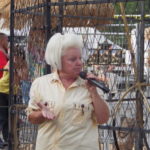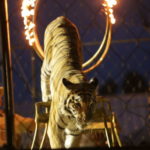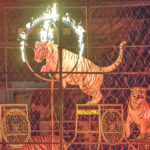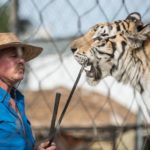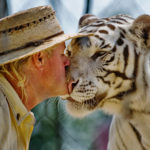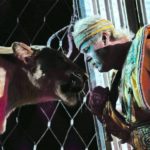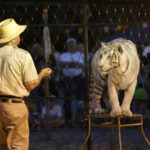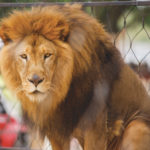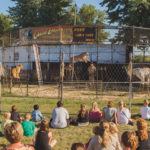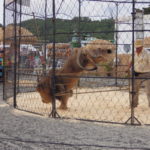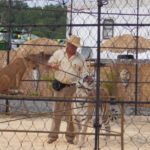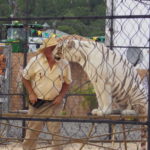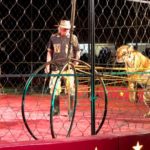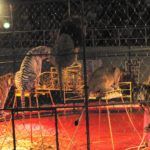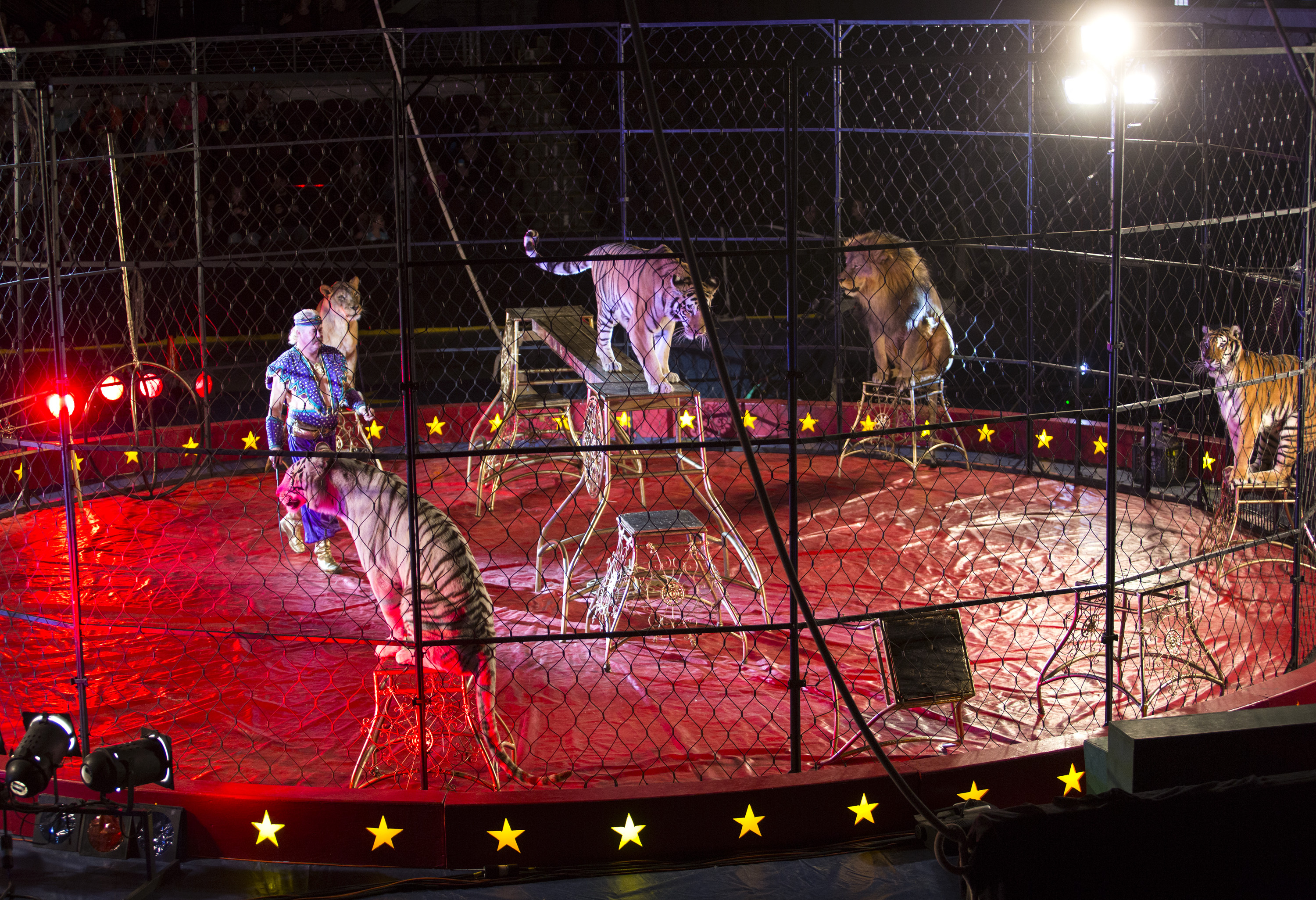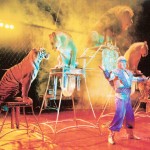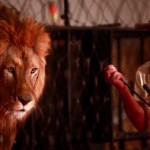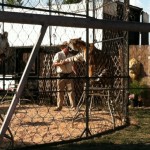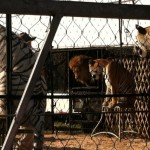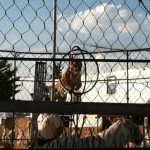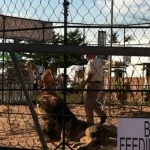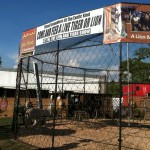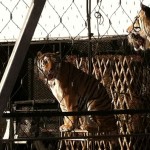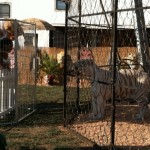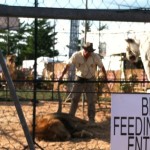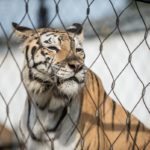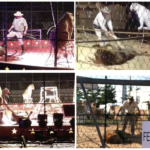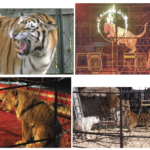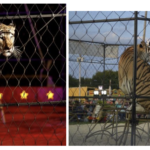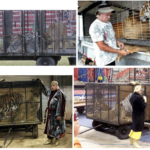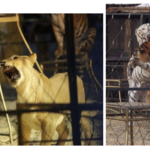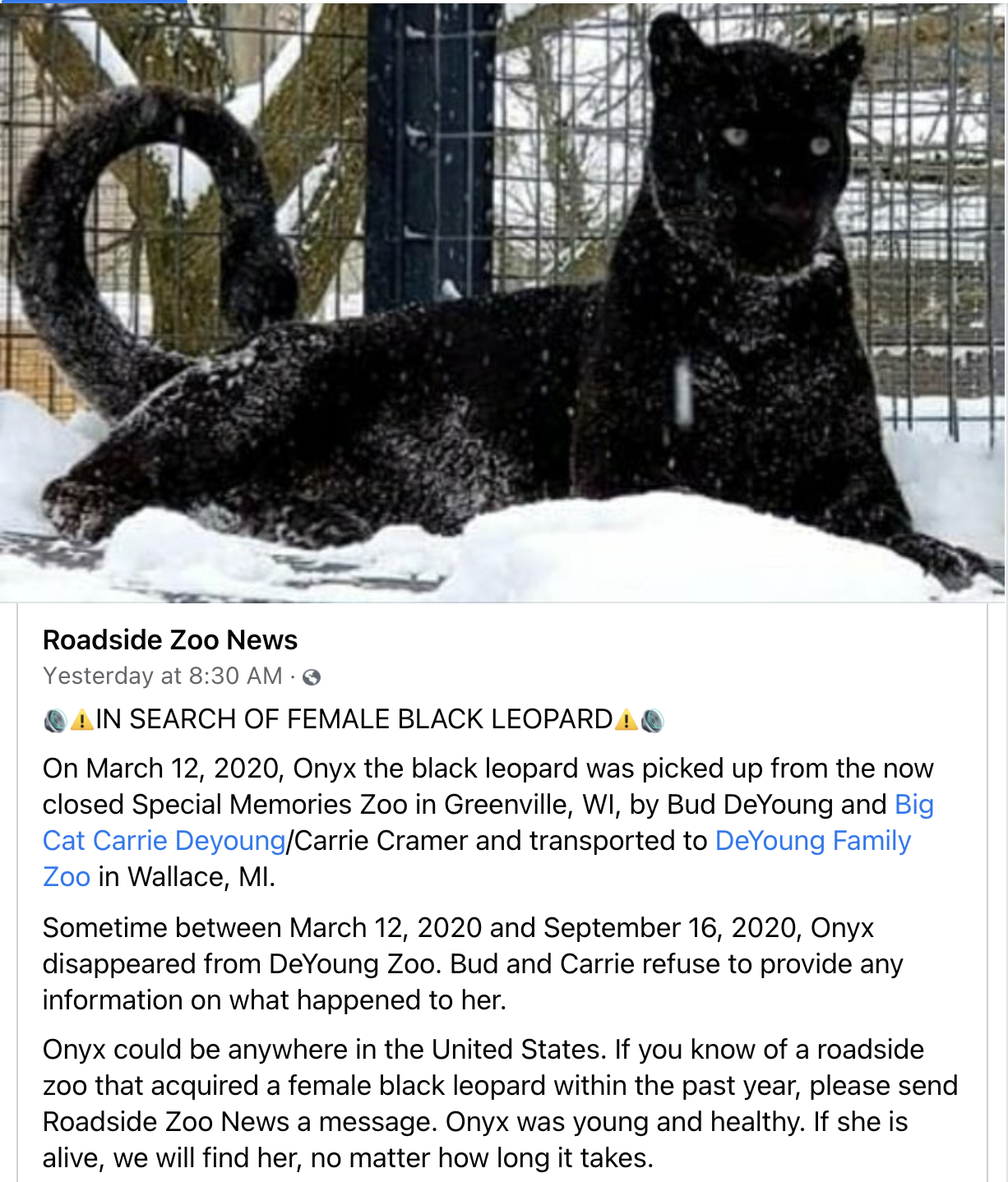Close Encounters of the Exotic Kind – Vincent Von Duke, Georgina “Pom Pom” Donoho”
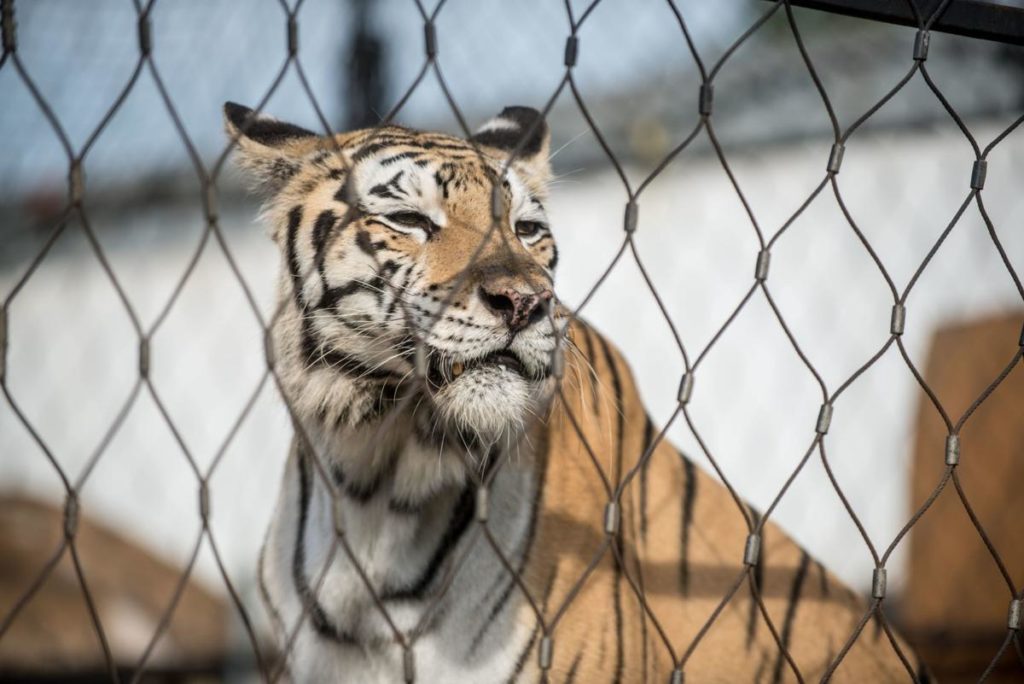
Updated October 2019
Vincent Von Duke is a sixth-generation circus trainer based in Lakeland, Florida who presents a traveling big cat show called Close Encounters of the Exotic Kind at Shrine circuses and fairs throughout the eastern United States. Von Duke formerly trained big cats for a circus which closed in the late 1980’s. When the circus shut down, he purchased the big cat act and continued touring as Close Encounters.
During the supposedly “educational” show, Von Duke’s five tigers and four lions are forced to jump through flaming hoops, sit on platforms, and perform other unnatural tricks. Videos of these performances frequently show Von Duke physically dominating the cats by stepping on them, shoving them, and dragging them across the ground for show. A promotional website for Close Encounters states that Von Duke is “hailed as “The Beast Master” for the manner in which he trains and presents a big cage full of performing African Lions and Asian tigers.”
While “performing,” the cats consistently display obvious stress behaviors such as snarling, flattening their ears, flinching away from Von Duke, and swatting at him and the other cats in the ring. After each show, the cats are returned to small cages inside a four-foot-wide trailer where they are housed during travel, display, and the off season. THESE CATS NEVER GET TO EXPERIENCE AN AREA LARGE ENOUGH TO RUN OR GET EXERCISE.
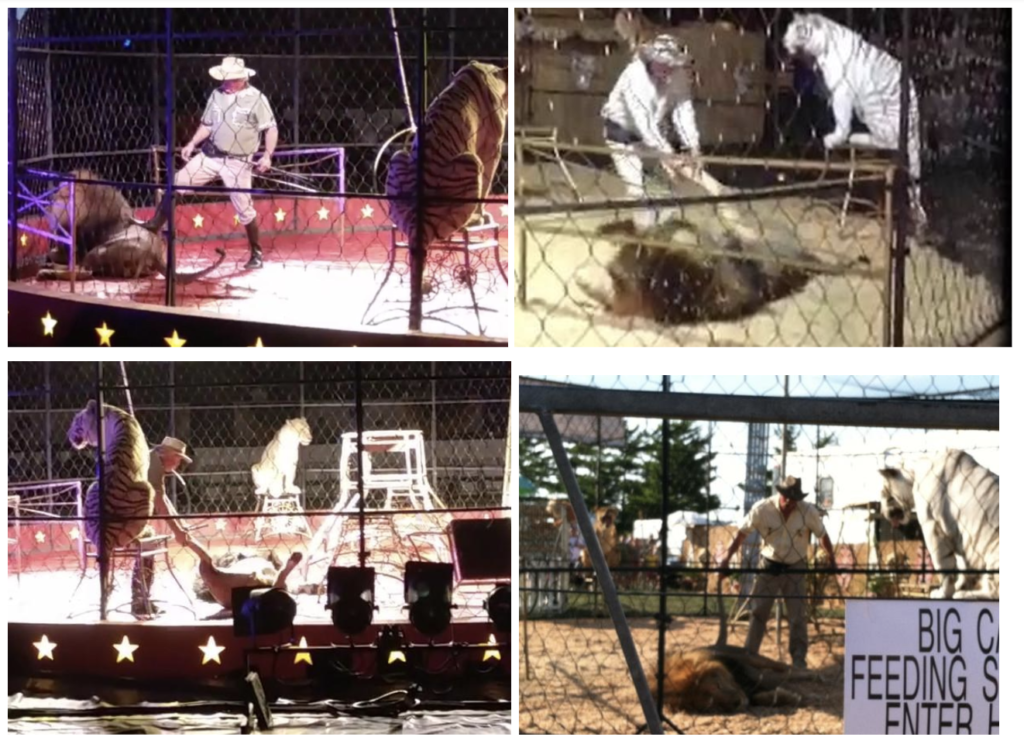
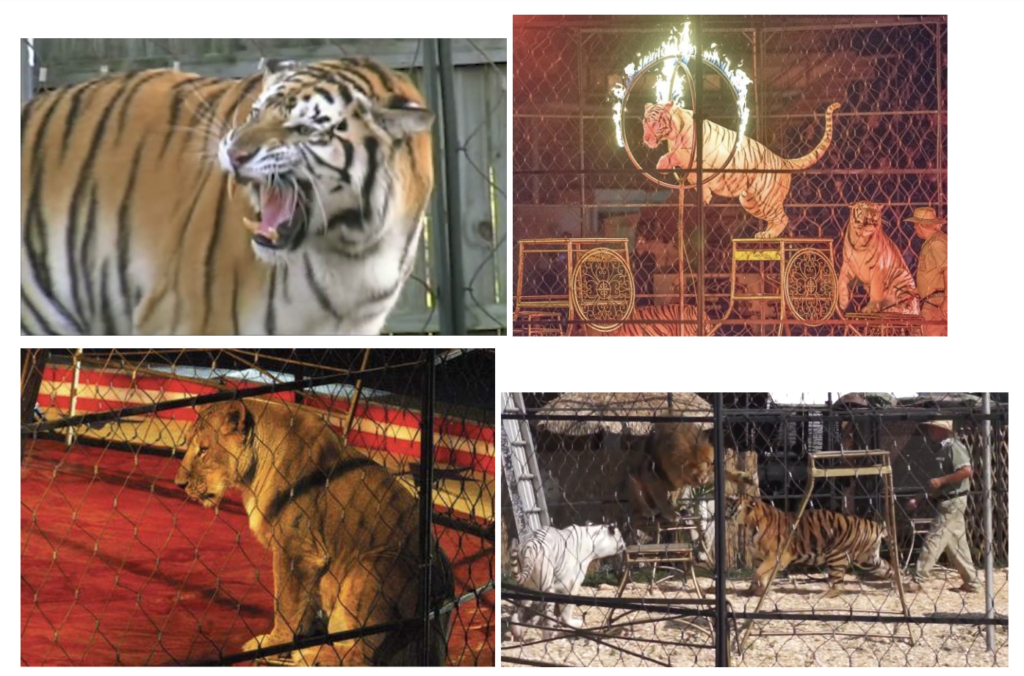
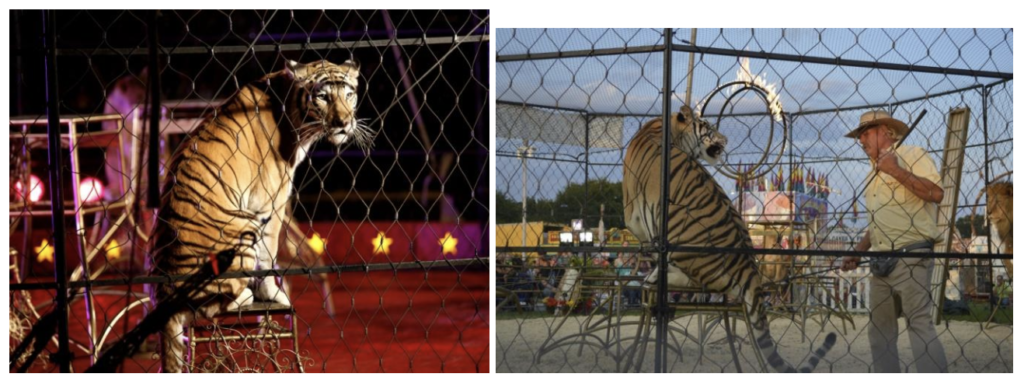
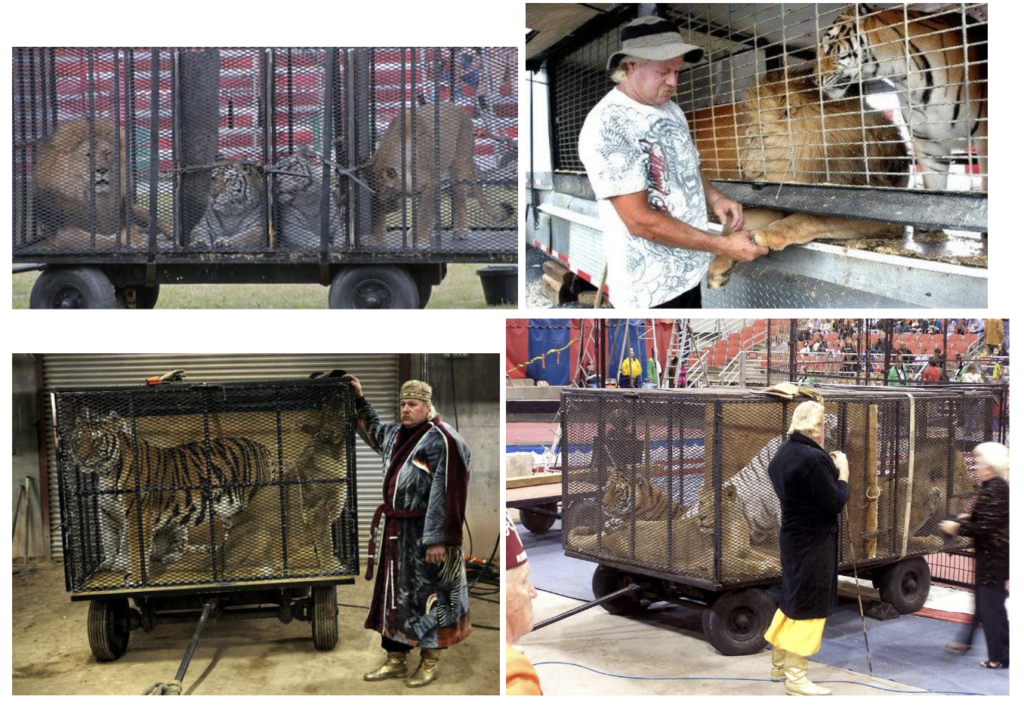
The cats in Von Duke’s show were purchased as cubs from substandard roadside zoos and backyard breeders in the United States. Von Duke has known affiliations with disreputable breeders such as Josip Marcan, Robert Engesser, the Rosaire family, and Doug Terranova. At least one of Von Duke’s lions was purchased as a newborn cub for $300 from the notoriously inhumane Brown’s Oakridge Zoo, a backyard big cat breeder which has been described as a “puppy mill for endangered animals” and which has been fined by the USDA for housing lion and cougar cubs in flooded, mud-filled enclosures and for repeatedly failing to provide animals with adequate food, water, and veterinary care.
Vincent Von Duke does not have a USDA license to exhibit big cats and instead operates under the license of his wife and traveling partner, Georgina “Pom Pom” Donoho. Under that license, Close Encounters of the Exotic Kind has been repeatedly cited by the USDA for failing to meet even the minimum requirements of the Animal Welfare Act.
December 5, 2013: Close Encounters was cited by the USDA for housing four adult tigers and three adult lions in a four-foot wide travel trailer during the off-season. The inspector wrote that the cats were packed two at a time into four-foot tall travel cages so small that they were unable to stand up, stretch, or turn around. The USDA mandated that more space be provided to the animals to “be able to stand for stretching, playing, or any reason at all times”, however recent satellite images of the property used as “winter quarters” by Von Duke appear to show big cats still being confined to travel trailers and sheds.
During this inspection, Close Encounters was also cited for failing to provide an environmental enhancement plan for lemurs, failing to secure the bottom of the big cat training ring to the ground, and failing to have a perimeter fence to contain escaped animals.
March 2, 2015: Close Encounters was cited by the USDA for failing to be present at their facility to allow an animal welfare inspection.
September 13, 2014: A fairgoer filmed Von Duke punching a tiger to force it to jump to another platform during a show. The tiger has her ears pinned back in fear and attempts to walk away, but Von Duke forces her to “perform” by goading her towards the platforms with a stick and repeatedly jabbing his fists into the tiger’s side and stomach to make her jump.
August 18, 2011: A white tiger named “Kaya” was photographed performing at the Rockingham County Fair with a large sore on her elbow, an ailment commonly seen in circus tigers which spend the majority of their lives lying on hard surfaces.
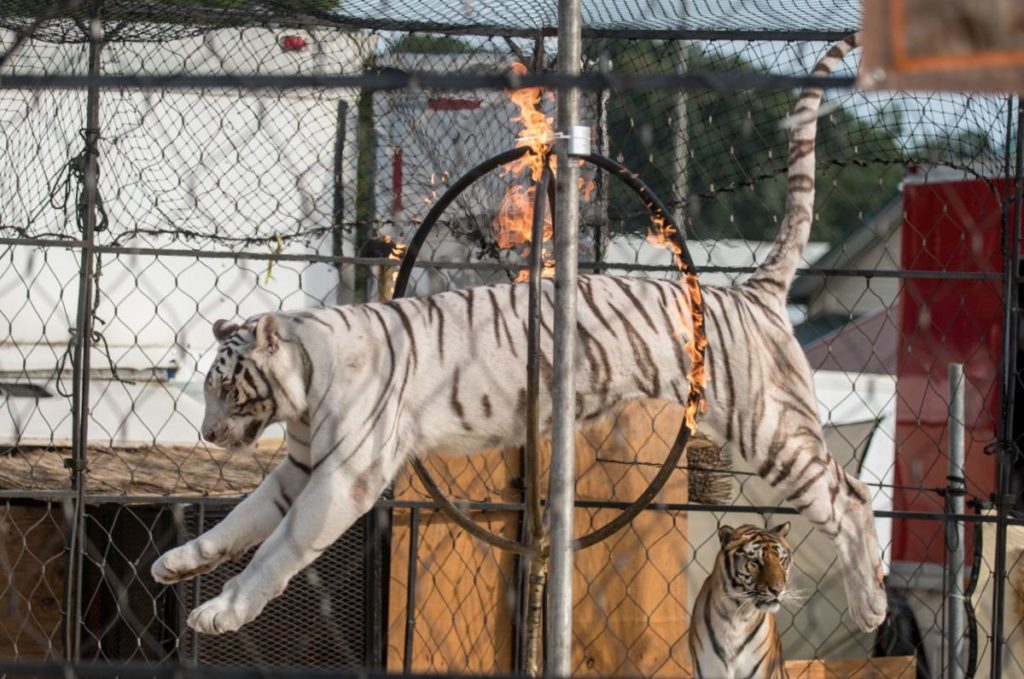
July 21, 2014: The Cecil Whig published a photo of a lioness with all four canine teeth broken or missing at the Cecil County Fair. Circus big cats often break their teeth by biting the bars of their cages. The paper also published a photo of a fight which broke out between two of Von Duke’s tigers before the show began.
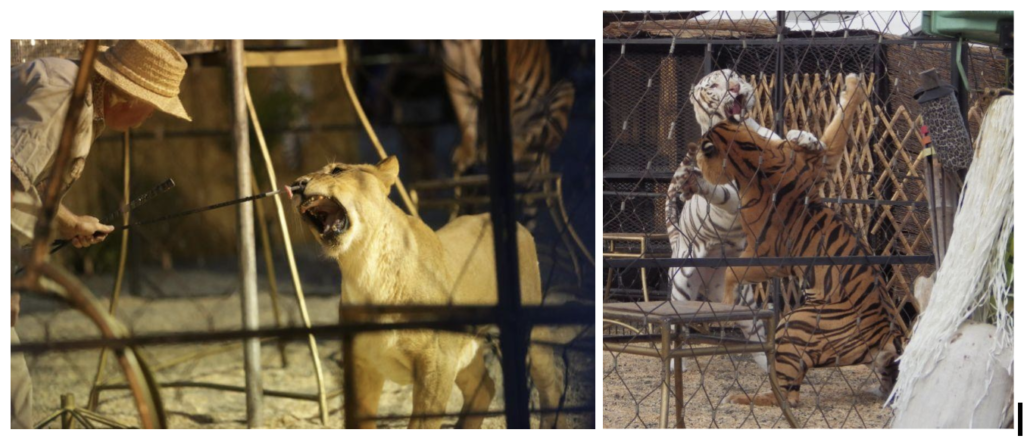
April 25, 2014: Close Encounters was cited by the USDA for transporting and displaying 4 lions and 5 tigers in a travel trailer lined with wood that was “damaged, splintered and missing pieces.”
October 2, 2013: The Robesonian reported that a lioness called Chi Chi “squatted on all fours and glared while two maintenance men sprayed pesticides near the stage” at the Robeson County Fair.
August 6, 2013: Close Encounters was cited by the USDA for failing to have an adult available to allow an inspection of their property and for failing to file a travel itinerary with the USDA, in violation of the Animal Welfare Act. Traveling animal acts are legally required to file an itinerary with USDA so that an inspector can be sent to the location where the animals will be performing if there are public complaints. Many acts will send these immediately before traveling or not at all in order to dodge inspection and avoid public scrutiny.
July 27, 2013: The Nonpareil Online described the opening of the Close Encounters fairground show as “a salvo against any animal rights activists that question their business.”
November 5, 2012: Close Encounters was cited by the USDA for failing to have an adult available to allow an inspection of their property and for failing to file a travel itinerary with the USDA.
November 15, 2011: Close Encounters was cited for failing to have an adequate perimeter fence to contain the cats and prevent public contact. Portions of a wooden perimeter fence had broken panels and were leaning outward, and portions of a wire fence were “too flimsy [and] not supported by posts.” This inspection report also noted that Von Duke was housing his big cats in a training ring which had not been approved for compliance with the Animal Welfare Act and that he had recently acquired a lion and tiger cub which lacked a written diet plan from a veterinarian.
April 12, 2011: Close Encounters was cited for failing to have an adult available to allow an inspection of their property and for failing to file a travel itinerary with the USDA.
February 3, 2011: Close Encounters was cited for having an inadequate perimeter fence which was “not structurally sound.” Inspectors gave Close Encounters until April 2011 to repair the fence, but by the November 2011 inspection the fence was still inadequate and Close Encounters was cited again.
February 26, 2010: In an inspection at the Tulsa State Fairgrounds, Close Encounters was cited by the USDA for feeding human multivitamin tablets to the tigers as a substitute for nutritional supplements prescribed by their veterinarian. The inspector warned that “dietary insufficiencies may lead to long-term metabolic disturbances” in the animals.
April 29, 2006: While working for the El Jebel Shrine Circus, Von Duke was cited for housing two lionesses in a travel enclosure with a damaged roof and cracked fiberglass tiles protruding into the enclosure.
January 24, 2006: A USDA inspector cited Von Duke for failure to keep animal enclosures in good repair. A cage housing two tigers had bars which were “excessively rusty and could possibly compromise the structural integrity of the enclosure.” The walls of an enclosure housing a single lion were covered in sheet metal which was coming loose at the bottom and was sharp and jagged. Plywood partitions separating tigers were excessively worn and splintered.
January 19, 2005: Vincent Von Duke was cited by the USDA for failing to make his facility and animals available for inspection as required by the Animal Welfare Act. Upon arriving at the property, the inspector noted that the gate was locked and Von Duke was unable to be reached.
Misleading the Public
Like most exploiters, Vincent Von Duke and his wife make many misleading claims in order to justify what they do. They often tell audiences and the media that their big cats are “just like housecats” and that because they were bred in captivity, “they’re not wild animals,” implying that this makes it OK to exploit them. This false claim ignores the fact that tigers and lions are not domesticated and will always retain the hardwired instincts of a wild animal, regardless of where they were born and how they were raised.
On the Close Encounters website, Von Duke boasts that “We were proud to participate in very specialized testing that reflected when traveling, in fact, performing big cats do not suffer from stress.” This appears to be referring to a 2003 study performed by researchers at Texas A&M University. Although Von Duke did participate in the research, the purpose of the study was simply to determine the amount of time circus tigers spent in various postures during transport, not whether or not the cats were “suffering from stress.” Stress is seldom mentioned in the published paper at all, and the authors never claim that circus tigers do not suffer stress.
What this study does reveal is that while traveling from Fort Worth to Houston with the Hermanos Vasquez Circus, Von Duke’s four tigers were confined to an 8 X 8 foot cage in a travel trailer for over 12 consecutive hours. Temperatures inside the trailer were measured at 93 degrees.
Another Texas trip from College Station to Dallas took approximately 4.5 hours, and the author writes that the cats had been “caged a majority of the previous day without performing or having access to an exercise pen.” The paper concluded that Von Duke’s tigers “exhibited more frequent pacing behavior throughout transport” when compared to other circus tigers studied.
An excerpt from this paper also discussed Von Duke’s unnatural practice of transporting his tigers as a group and his unique method of breaking up fights:
“…Adult tigers in the wild are solitary, and not members of social groups…mature tigers that have not been raised together are difficult to combine and if they do fight, severe injury may result within seconds. The von Duke cages were built into the aluminum trailer. Major movement by the cats could be felt by the driver in the tractor, and the driver was always Vincent von Duke or his wife. Although von Duke first assembled the group of tigers that we studied when the tigers were cubs and they did not display aggression toward each other, if a fight did start while the tigers were being transported, [Von Duke] would feel it in the cab and a sudden application of the brakes would cause the tigers to cease until the truck could be stopped and the cats separated.”
Shrine Circus Cruelty
Vincent Von Duke has performed with multiple Shrine Circus companies that are notorious for animal abuse, including the Jordan World Circus, Hermanos Vasquez Circus, and Hamid Circus.
The Jordan World Circus no longer has its own USDA license to exhibit animals, but was formerly fined by the USDA for handling animals “in an abusive manner” and continually failing to provide animals with food, water, and veterinary care. Jordan World Circus was cited by the USDA for failing to seek treatment for a malnourished tiger with a broken leg, for forcing a tiger to perform while sick, for beating tigers with rods for four minutes when they refused to leave their cage, and for leaving tigers and lions in small travel cages for up to 11 days without any exercise. Inspectors noted that the Jordan World tigers “performed with reluctance,” appeared “resentful” and “were treated harshly.”
The Hermanos Vasquez Circus has been cited for repeatedly failing to provide tigers with adequate space or exercise, and in 2008 a female tiger traveling with the circus was found dead in a cage with five other tigers and her head nearly ripped off her body. The necropsy found the cause of death to be “[l]oss of blood and integrity at the neck.”
As of 2018, Von Duke is touring with the Hamid Circus, where an elephant killed her trainer after being shocked by an electric fence and horrified circusgoers watched as dogs were punched and kicked in the face during a performance. The Hamid Circus has also partnered with notorious elephant abuser Hugo Liebel, who has since been charged with animal cruelty after racking up hundreds of animal welfare violations, including repeatedly chaining an elephant so tightly she could barely move. According to a whistleblower’s report to the federal government, Liebel turned off the lights and beat the elephant while she “was staked down by all four legs” and “directed others to take part in that by using other objects such as [a] sledge hammer and shovel handles.”
When Portland, Maine amended its local ordinances to prohibit circuses and other traveling shows that display wild and exotic animals, the legislation singled out Vincent Von Duke in particular, stating that “Vincent Von Duke’s big cat act has been cited by the United States Department of Agriculture for failure to provide minimum space and a proper diet to its lions and tigers.”
The ordinance, which was approved by the city council, also acknowledged that big cats “suffer when caged and when hauled in trucks and trains around the country;” that “enforcement of national and state animal welfare laws are inadequate” to protect performing animals from abuse, and that “attitudes toward wild and exotic animals have changed since it was considered simple entertainment to watch them do tricks, and spectators are now more likely to find the tricks themselves a form of cruelty.”
Articles
Lions And Tigers Put On A Show
By Laine Griffin The Daily News-Record Aug 13, 2019
HARRISONBURG — Starting in England and Ireland — seven generations later, Georgina Pompom is keeping close encounters with the exotic kind.
Pompom, a native of England, grew up with lions and tigers in her home and at 8 years old, she began training the animals to perform and be a part of the circus lifestyle.
Now she puts on shows with her husband of 33 years, Vincent VanDuke.
VanDuke was also born into the circus lifestyle, but started out in Germany.
“This was handed down to us, just like farmers are handed down that lifestyle,” Pompom said.
At the show Monday evening at the Rockingham County Fair, the couple showed off their lion, Mufasa, and three female tigers — Nipper, Kaya and Narnia.
As the animals came out of hiding in their air-conditioned truck, the large crowd echoed with applause.
Heather Eberly watched as the lions and tigers jumped through fire and did their obstacle courses.
Eberly, who has been attending the Rockingham County Fair since she was a kid, said she has always been partial to the lions because of how beautiful they are.
“I’m impressed by how well-trained they all are,” she said. “I have only seen them at the zoo, so I’ve never seen them in this light.”
She said she is curious what their lives are like outside the show and how they get raised and trained.
Pompom said many people think lions and tigers are abused and taken from the wild to be trained to work in the circus and fairs.
“We have never gotten a lion or tiger out of a jungle,” Pompom said. “They are all hand-raised. We get them from breeders at 4 months and they live in our home.”
From the time the animals go home with Pompom and VanDuke in Florida, their grandchildren bottle-feed them.
“We get up every morning and start work with them, which includes bathing them every day and feeding them and giving them water, and eventually training them,” she said. “But this isn’t a job. It’s a lifestyle for us.”
But the best part about training them is getting to take them around the United States to shows and seeing the crowds come to see the intelligent animals.
“I love being able to meet new people. It makes this so rewarding and to me, it’s the best part,” Pompom said, adding that traveling is also the hardest part.
Sheri Kale stopped by to watch the show with her kids, Leah and Bailey, 8-year-old twins who were celebrating their birthday.
“They are so big!” Leah said as she pointed at the animals.
Bailey was more focused on the white tiger at the show.
“I like the one in white,” Bailey said. “It’s pretty. It’s my favorite.”
Pompom said the tigers are very intelligent and are easier to train than lions.
“Lions are lazy and stubborn,” Pompom said. “So they really like getting their raw meat treat whenever they do something right.”
Traveling from New York to Pennsylvania to Rockingham County, Pompom said she is excited to be able to put on the “Close Encounter of the Exotic Kind” every day throughout the fair.
“We are excited to be here and bring our family to be a part of the fair,” she said in reference to the lions and tigers. “It’s always fun to be able to be a part of the show.”
Lions and tigers thrill fair goers in Sykesville
By Eric Hrin The Courier Express Aug 11, 2017
SYKESVILLE – Roaarrrrrr!
The sound of a lion can be heard on the Sykesville fairgrounds.
The ferocious roar comes from “Close Encounters of the Exotic Kind,” a lion and tiger show at this year’s Sykesville Ag & Youth Fair.
The attraction is thrilling fair goers with its big cats.
One child, Ethan Lauer of Brookville, enjoyed the show this week.
He said his favorite part was when he saw a tiger jump through a hoop.
Georgina “Pom Pom” Donoho and her husband, Vincent Von Duke, who own the show and the animals, said they’ve had good crowds for the show. It’s presented at 7:30 p.m. and 9 p.m. daily, with an extra show at 3 p.m. on Saturday, according to the fair schedule.
The fair’s webpage shows a photo of one of the show’s lions, Mufasa.
“We call him Mo,” Donoho said.
The 8-year-old lion was born in a private zoo in Springfield, Ill.
“He’s a spoiled brat is what he is,” she said with a laugh.
In total, they have 10 big cats with them, two male lions, two female lions and six tigers, which includes two white tigers, three regular tigers and a very rare tiger, called a tabby.
“She is blond with ginger stripes,” Donoho said of the tabby. “She’s beautiful.”
When asked if Mo is the star of the show, Donoho chuckles.
“He thinks he is,” she said. “Yes, he’s very popular.”
Their old lioness, Chi Chi, also makes an impression.
“She is very popular, because she’s a comedian,” Donoho said. “She’s a character. She has her own personality.”
The lioness was born in Orlando, Fla.
Donoho said none of their big cats come from the wild.
“They haven’t brought an animal in since 1978, when they passed the Endangered Species Act,” she commented.
The big cats are born and bred in captivity.
Donoho said the show is an educational program. They talk about how much food and what kind of food the lions and tigers eat, and how long they live.
“I try to answer every question that people ask,” she said.
In the show, the lions and tigers jump hurdles and through a fire hoop. There’s also a lot of comedy.
Despite pressure from activists, circus animal acts go on
The show goes on at the Osman Shrine Circus, a fundraiser for the local Shriner fraternity, as others like Ringling Bros. and Barnum & Bailey plans to retire the last of its elephants next month.
By Sharyn Jackson Star Tribune March 31, 2016
There’s an elephant in the room — three, actually — at the St. Paul Osman Shrine Circus. The 93-year-old show, running this weekend on the Minnesota State Fairgrounds, continues to exhibit exotic animals, even as larger circuses are phasing out their pachyderm performers.
After years of pressure from animal welfare activists, the big cats and elephant acts are facing an uncertain future. Ringling Bros. and Barnum & Bailey plans to retire the last of its elephants next month. Dozens of municipalities in recent years have banned the use of exotic animals in the circuses that pass through town. Handlers, who have to keep up with tightening restrictions and ballooning paperwork, are leaving the business. And circus producers admit uncertainty about the future of animals in their shows.
But the show goes on at the Osman Shrine Circus, a fundraiser for the local Shriner fraternity. Animals, says spokesman Jim Berg, are one of the biggest draws to the annual event, which raises a majority of the club’s funds for the year.
“People call and ask, ‘Will you have the elephants?’ The animals are what make it the true American circus,” Berg said.
Activists, however, claim the methods used to train exotic animals are abusive, and that their living conditions are inhumane.
“Captivity just couldn’t be worse for elephants and tigers,” said Rachel Mathews, counsel for the Captive Animal Law Enforcement division for the People for the Ethical Treatment of Animals Foundation. “Abuse has no place at a family-friendly event like a Shrine Circus.”
With Ringling’s decision, as well as SeaWorld’s recent announcement that it would end its orca breeding program, Mathews says attitudes have changed enough that animal-free circuses could be the way of the future.
“Ringling is simply the first domino to fall, and the writing is on the wall that people don’t want to see animals used in the circus,” she said. “Human performers are the true star of the show, and the show is absolutely going to go on without animals.”
Those in the industry acknowledge the power of public opinion.
“We’re losing the battle,” said James Hamid of New Jersey-based Hamid Circus Inc., producer of the Osman Shrine Circus. “And it’s just a PR battle we’re losing, because when people come in and actually see the animals and how well cared for they are, it changes your opinion.”
Seals and chimpanzees have already vanished from circuses, and there are only a couple of dog acts and bear acts left in the country.
For those who have devoted their lives to the circus, a show without animals is inauthentic, even sad.
“People complain that circuses are antiquated and want to do away with animals entirely, which is ridiculous,” said Peter Sturgis, who is in his 36th year as a ringmaster. “Animals are the circus. [Without them], we’d be in a very sad state of affairs.”
A fading tradition
The handlers working the show insist their animals are cared for according to code, even as those codes get stricter.
On the fairgrounds, a long, white trailer divided into cages is the mobile home of two tigers, two lions and a lioness. They were born in captivity; Mofasa, an African lion with a grand mane, was the size of a “stuffed animal” when sixth-generation trainer Vincent Von Duke bought him for $300 eight years ago. Von Duke bottle-fed the lion.
“Basically, we’re like farmers, with 10 minutes of glamour a day,” Von Duke said. “These are not wild animals.”
The animals are housed during the circus in the Cattle Barn. The elephants, which go on last in the show, stay in a white tent with hay covering the floor, an electric heater recreating the warmth of the tropics they were born in.
Brian Franzen, their owner, says his is one of around 15 elephant acts still in operation, not including Ringling. One of his charges, Ellie, is older than he is; his father, Wayne, a Wisconsin dairy farmer who loved exotic animals, bought her. (Wayne Franzen was killed during a tiger act in 1997.)
Franzen has long been a target of activists; PETA has a fact sheet on him that lists years of animal welfare complaints. Though he lightheartedly refers to circus protesters as “my friends who gather out there with the signs,” their allegations against him of abuse, he says, are “slander and it’s not true.”
About an hour before the first St. Paul show Thursday morning, dozens of kids lined up for rides on a live pony merry-go-round, and on one of two elephants, for $10.
Becky Jelinek of Menomonie, Wis., took her children, Annabelle, 2, and Charlie, 5, for a ride on Patty the elephant. She is aware of the controversy over animal abuse at other circuses.
“If I heard anything about that [here], then I probably wouldn’t go,” she said.
But if animals were banned altogether? “It doesn’t mean the worst thing,” she said. “The circus is still the circus.”
Big cats bring big thrills at the fair
By Jane Bellmyer The Cecil Whig Jul 21, 2014
FAIR HILL — You may think your life is crazy at times, but for Georgina “Pom-Pom” Donoho and Vincent Von Duke, life is a a bonafide circus.
“When I met Vince, we were in a circus,” Donoho said on Sunday on a break from performing at the Cecil County Fair. “He was working with cats. I was working with elephants.” Now married 27 years, the couple first brought “Close Encounters of the Exotic Kind” to the fair in 2006. They are back this year with their collection of big cats, including African lions and both Bengal and Siberian tigers.
The show features five of the big cats jumping over gates and through fire. Ahead of each performance, Donoho warms up the crowd by explaining that, while the animals have foreign bloodlines, all were born in captivity in the United States.
“We’ve got three babies in training,” she added.
According to Donoho, while their animals are much larger than a domestic house cat, a feline is a feline. “We’ve been doing it so long that you can tell what they’re going to do before they do it,” she said.
As the tigers were brought out for a Saturday afternoon show, they nuzzled each other one moment, then reared up and slapped at each other the next.
“They’re just like house cats,” Donoho told the audience.
Close Encounters of the Exotic Kind offers several shows each day during the nine-day run of the fair. At the end, the public can line up and feed one of the big cats, using the same tool the couple uses to offer bits of raw meat as a reward during the performances.
The couple calls Sarasota, Fla., home, where Donoho also operates a petting zoo. While traveling from one venue to the next, she said the animals are usually sleeping, but sometimes a growl or a snarl will pique public interest when they stop to refuel. “We try to stay incognito … but once in a while they spot that they’re there,” she said.
She’s been performing since she was 8, so traveling with animals and interacting with the public is second nature. Donoho is not the only family member still performing in the circuit.
“My younger sister is Galaxy Girl,” she said. Fans of the fair will recall that woman as the one who performed acrobatics from the top of a 127-foot tower in 2005.
Fair’s animals range from wild to the barnyard variety
The Robesonian October 2, 2013
LUMBERTON — Georgina Donoho and her husband Vincent von Duke encountered a problem while trying to get their lion to pose for pictures on Wednesday — Mofasa’s playfulness.
“Mo, you’re being a bugger,” Donoho said as Mo ran around the enclosed stage after being released from his pen.
Mo won’t be able to avoid the public eye starting Friday, as he and eight other lions and tigers — about 2 tons of wild — perform for spectators during “Close Encounters of the Exotic Kind” at the Robeson Regional Agricultural Fair.
Across the field from the cats will be the Barnyard Review, a childrens’ show and new attraction to the fair. Both shows will run all nine days of the fair.
The animal show is making its third appearance in Robeson County after debuting at the 2011 county fair.
“I guess we were really popular last year, so they asked us back,” Donoho said.
Donoho said she and von Duke make their shows informative and fun.
“We do an educational program — where the animals were born, the difference between lions and tigers, what they eat …,” she said. “Then they come out and put on a show. There are a lot of laughs in the show and they will jump through a fire hoop.”
Spectators can feed a lion or tiger for $3 or two for $5 after the show. All proceeds benefit the animals.
Donoho said she and von Duke own four lions and five tigers, including a white tiger named Kaya. All of the cats were born and raised in the United States.
“They were bottle-fed babies,” she said. “To us, we are Mom and Dad. Chi Chi [a lioness] grew up in our house. She slept in the bed with Vincent and me.”
Donoho said each cat eats 20 to 30 pounds of food per day, including beef and chicken. Despite living a captive-bred life, the cats claw onto the hunter’s instincts they were born with.
“You’ve got to remember that they’ve been on this Earth a lot longer than we have,” Donoho said as Chi Chi squatted on all fours and glared while two maintenance men sprayed pesticides near the stage. “They don’t lose their instincts. They know exactly what they’re doing at all times.
Donoho is the sixth generation of her family to work in the entertainment business. Her ancestors owned the Scott Family Circus in England and performed horse shows during the 19th century.
“My great-great-great-grandfather performed for Queen Victoria in 1800 in Windsor Castle,” Donoho said.
She said she and von Duke take their show around the eastern United States as well as Maine, Ohio and Michigan, but rising fuel costs are making travel more difficult.
“It costs $800 to $1,000 to fill up the truck,” she said.
Despite the financial pressure, Donoho said she and her husband invest their lives in their profession.
“This is not a job,” she said. “It’s a lifestyle. We live it, we breathe it, we never leave. It’s like any business. There’s good and bad in everything.”
Big cats roaming the Fair all week long
By Chris Reber The Pocono Record Aug 24, 2013
Like many exhibitors at the West End Fair, the Von Duke family are a farming family at heart.
But instead of livestock or corn, the couple raises lions and tigers for “Close Encounters of the Exotic Kind,” the traveling show they’ve co-hosted for more than 20 years.
The Von Dukes, Vincent and Georgina, aka Pom Pom, will be showcasing their big cats throughout the entire week at the West End Fair.
“It’s like farmers, We’re with our animals 24 hours a day, we’re caretakers, we go home in the winter, then get ready in the spring,” Georgina Von Duke said.
Big cat shows have been featured at the fair in the past, but not in recent years, fair marketing director Jim Johnston said.
The Von Dukes’ show at the fair will include six cats — three lions and three tigers — highlighted by their quarter-ton male lion — Mufasa aka Mo.
“He is a big boy. Right now I would say he weighs anywhere between 500 and 600 pounds and he is a sweet boy,” Georgina Von Duke said.
The Von Dukes have been putting on their traveling show for about 25 years, but they’re life-long animal trainers. They started Close Encounters after the circus they trained animals for folded in the late 1980s.
“I was training elephants, and he was training cats. The circus closed, and we had the opportunity to buy our original act,” Georgina Von Duke said.
Over the years they have faced opposition from animal rights groups, but Pom-Pom maintains that the Close Encounters cats are happy, humanely raised animals.
“Don’t get me wrong, there are some people in this business… But we don’t all train the same. Our technique is to keep them happy,” Georgina Von Duke said.
While the life expectancy for a wild lion or tiger is about 10 to 12 years, the Von Dukes have had animals live to be 20 years old. Georgina Von Duke says some of that can be attributed to the animals’ diet.
“They eat the meat, and Vince and I eat the rice and beans. It’s not cheap. You can’t cut corners with the animals when you have to buy the best,” she said.
With a daily portion of 20-30 pounds of meat per animal, the couple ends up buying most of the meat each day. They’re particularly partial to chicken from New York state, Georgina Von Duke said.
“They taste different waters in the different parts of the country, we buy them chicken fresh every morning so they get a different taste,” she said.
While the shows are typically during the summer fair season, rasing the animals is a year-round job for the family.
“We are slaves to our animals. We never leave them, we’ve never been on a vacation,” she said.
That’s been the scenario for the Von Dukes since they were children. Pom-Pom emigrated from England as a small child, when her family got a job with a circus in Georgia.
“Vince’s family came from Germany originally, His grandfather taught him to raise cats when he was, like, seven.”
Today the family has nine cats at their home/compound in Bradenton, Florida — three young ones are not ready to join the show quite yet.
They continue to face opposition — activists have tried to promote legislation that would prevent shows like Close Encounters from traveling state to state — but they continue to be driven by their lifelong passion.
“I know it’s a cliche, but we absolutely love our animals and we’d do anything for them,” Pom-Pom said.
Lions, tigers, magicians and more entertain at Westfair
By Mike Brownlee The Nonpareil Online Jul 27, 2013
Three times a day Vincent and Georgina Von Duke show off their kids to Westfair attendees.
Tigers Nania, Nipper, Sheik and Kaya, along with lions Mufasa and Chi Chi, entertain as part of the Close Encounters of the Exotic Kind show.
“They’re our family,” Georgina Von Duke, who goes by the nickname Pom Pom, told the gathered on Friday afternoon. “We’re with them 24 hours a day because we can’t find babysitters.”
The Von Dukes, along with a handful of employees, operate out of Sarasota, Fla., hauling a total of nine felines – including three cubs – across the country during the spring and summer. Georgina explained that during the spring they travel with the Shrine Circus and come summer it’s fair season.
In all, they’re on the road – with brief respites back in Florida – from March until October, depending on bookings.
“It’s not a job,” she said. “It’s a lifestyle, a way of life. We eat, drink and breathe this.”
She added, with a laugh, “we don’t know anything else.”
Georgina was born into an England circus family and is a seventh-generation animal handler. Vincent’s a sixth-generation member of the profession. They’ve been together 25 years and live on a ranch, where they house, care for, feed and train the animals.
“We’re kind of like farmers,” she said, taking a look at her surroundings for an analogy. “Our parents taught us, they handed down the profession. We spend the winter getting ready for the spring, then work during the warm months.”
At the beginning of each show Georgina greets attendees and introduces the animals – tiger varieties include Bengal and Siberian, the lions are African – which she notes were all born and bred in the United States. The opening is an act of full disclosure and a salvo against any animal rights activists that question their business.
“We don’t take animals from the wild, from the jungle,” she said. “We’ve had cats live to 27-years-old. That’s unheard of. We take care of ‘em.”
During the show Pom Pom does the talking, while Vincent enters the cage to take the cats through a series of feats, including jumping over fences, across two platforms and, in the finale, through an ablaze hoop. Bobbi Munch of Neola, with daughters Charlie, 11, and Frankie, 10, along with their friend Molly Nelson, 10, said they enjoyed seeing exotic animals up close.
“And I liked it when they jumped through the hoop on fire,” Charlie said.
Who is Vincent Von Duke?
and why can’t he be found under any of these names he uses in USDA’s records?
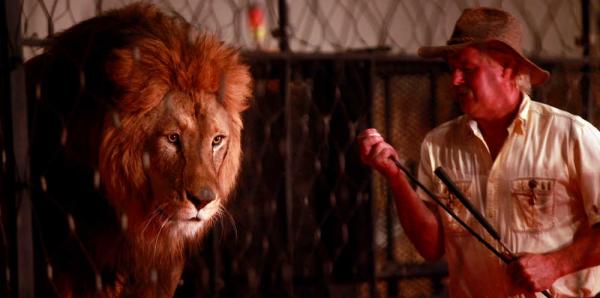 He is licensed in Florida to operate out of a Sarasota P.O. Box under ESA # 16769 which was issued on 10/2/11 with his location listed as P.O. Box 1418 Sarasota, FL 34230-1418 and a phone number of 941.938.2138. His Florida state license states that he and Georgina Donoho are at 14969 Beckett Road in Seagoville, TX 75159. His email address is listed as vincentvonduke@aol.com
He is licensed in Florida to operate out of a Sarasota P.O. Box under ESA # 16769 which was issued on 10/2/11 with his location listed as P.O. Box 1418 Sarasota, FL 34230-1418 and a phone number of 941.938.2138. His Florida state license states that he and Georgina Donoho are at 14969 Beckett Road in Seagoville, TX 75159. His email address is listed as vincentvonduke@aol.com
In 2004 he reportedly had a USDA license issued to Clyde Bros Johnson Circus Seagoville TX using that same email address above but there is no current USDA license number in that name or any of his other names listed here. He was said by USDA to have had 6 tigers back in 2004.
Despite having a traveling show that appears at second rate fairs there is no explanation for how he is displaying tigers legally. None of the reporters who have covered his appearances have done their homework to find out who he is, whether or not he is actually licensed to be taking tigers out in public and if so, under what name.
On a circus site I was able to discern that Georgina Donoho AKA Pom Pom Donoho was a circus performer and upon searching her name discovered this little old lady has a USDA license in her name 58-C-0788 and, low and behold, it is registered to the same P.O. Box 1418 Sarasota, FL 34230-1418.
In Nov 2011 Vincent Von Dukes AKA Georgina Donoho cited for an inadequate perimeter fence at their P.O. Box (no location given) and the report said they had just acquired new lion and tiger cubs and did not have vet care guidance for them. The report gave them until December 2011 to correct the dilapidated fence, but there was no follow up inspection or report. The inspection said that they should send in photos of their traveling act cage, but compliance is unknown.
In the following video you can see the cats shying away from him and skulking away in fear. How can anyone clap or call this entertainment?
This act features one male and one female African lion, two female tigers and one white female tiger.
Vince Von Duke’s wife, Pom Pom Donoho, can be seen to the left of the screen. She conducts various duties during the performance to include hooking up the 20 lb. propane tank for the FLAMING HOOP portion of the act. This was shot in Canton, Ohio on March 24, 2018 at the 7:30 show. This circus was produced by HAMID CIRCUS for TADMOR SHRINE of Canton. VINCENT VON DUKE performed in Dayton, Ohio in February, 2018 with a circus produced by TARZAN ZERBINI for Shriners. Please tell the Shriners that you won’t support them as long as they promote abuse in the name of family fun.
To update your search go USDA inspection reports.
